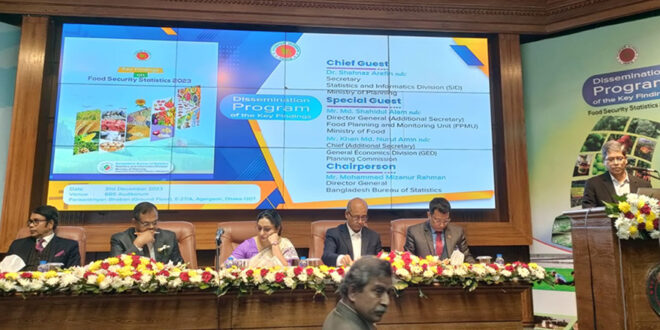About 21.91 per cent of Bangladeshi households are facing moderate food insecurity while 0.83 per cent are severe during the period from January 2022 to December 2023.
Bangladesh Bureau of Statistics (BBS) on Sunday revealed this report, the first in the country titled ‘Food Security Statistics 2023’, based on the corresponding period January 2022 to December 2023.
The BBS prepared the nationwide food security survey report maintaining global standards based on eight questions with the help of the UN Food and Agriculture Organisation (FAO).
The report found that the highest 1.42 per cent of households in the Sylhet Division feel severe food insecurity and the highest 29.98 per cent of households in Rangpur Division feel moderate food insecurity.
The BBS report found that the highest number of households in the Rajshahi Division feel secure in food stock as the lowest 0.51 per cent of households remain in severe food insecurity.
In Dhaka Division, the lowest 16.4 per cent of households are facing moderate food insecurity while 0.64 per cent of households face severe food insecurity in this division.
In consideration of severe insecurity, 0.95 households in rural areas feel severe food insecurity while this rate is 0.67 per cent in urban and 0.41 per cent in city corporation areas.
According to the report, the severe food insecurity by the main sources of income is Agriculture-0.94 per cent (households), Industry-0.27 per cent, service-0.79 per cent, income earner-0.61, and remittance-1.31 per cent.
In reply to a query Dr Shahnaz Arefin ndc, secretary of Statistics and Information Division (SID), a wing of BBS, and the chief guest of the dissemination programme of key findings of food security statistics 2023, told news agency UNB that food insecurity depends on factors beyond income. Despite being rich in consideration of income, people may feel food insecurity with regard to the availability or supplies of desired food.
Dr Shahnaz said the report was prepared maintaining global standards based on 8 specific questions in the nationwide survey, where 29,760 households participated. Besides, the stock data of different ministries and different food supply channels were also used, she said.
Md Abdul Halim, the project director, said that the report found that rural household owners can meet their food consumption 63 days a year from their stock of food.
He said that the per capita daily calorie received was 2461 k.cal in 2016 which has increased to 2516 k.cal in 2021. It means the national average calorie consumption has increased.
Among others, Khan Md Nurul Amin ndc, additional secretary of planning commission, Md Shahidul Islam, DG of food planning, Mohammad Mizanur Rahman, DG of BBS, Alauddin Al Azad, Director of Agriculture wing, BBS and Parimal Chandra Bose, deputy DG of BBS, spoke in the function.
(FE)
 Welcome to Business Outlook
Welcome to Business Outlook




